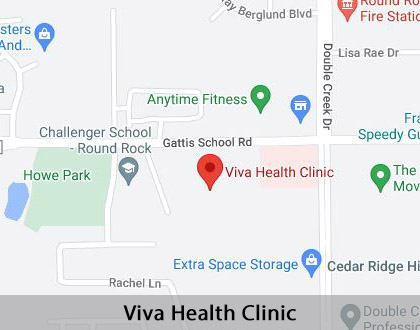Physical Exams Round Rock, TX
Having a routine physical exam is a great way to ensure that you are in good health. These physical exams are a preventative measure that can allow patients to catch up on vaccinations or detect a serious condition before it develops and causes further complications. A primary care practitioner can perform physical exams to determine the status of a person's general health.
Physical exams are available at Viva Health Clinic in Round Rock and the surrounding area. Our team can help you stay in good health. Call us today at (512) 243-5872 to learn more about our services or schedule an appointment.
Understanding Physical Exams
A comprehensive physical examination is a crucial part of checking the status of a patient's overall health. Unfortunately, most people tend to overlook physical examinations. However, it can be a source and reference for their practitioner. In the National Center for Biotechnology Information's Book on Clinical Methods, studies show that a thoughtfully performed physical examination can yield 20% of the necessary data for diagnosing an illness and managing symptoms.
Depending on the yearly physical results, a primary care practitioner can focus on certain areas that need attention. Many people may not have enough time to consult with a practitioner about concerns as they arise. The yearly physical may be an opportunity to discuss any issues or changes a patient may have noticed with their primary care practitioner. Having a yearly physical can help ensure wellness. Taking simple tests and asking some questions will help a practitioner get a detailed idea of the functions and capabilities of a patient's body. It can also help with the following:
- Getting lifestyle advice from a medical practitioner
- Maintaining an ongoing relationship with a healthcare provider or practitioner
- Maintaining the continuity of one’s medical records
- Prevention of diseases through early detection or treatment
- Updating prescriptions and immunizations
“A comprehensive physical examination is a crucial part of checking the status of a patient’s overall health.”
Reasons to Get a Physical Exam
There are various reasons why a person may decide to get a physical examination. The tests and screenings the patient will undergo may depend on the reason they provide. They should inform the healthcare provider or practitioner of the reason for getting physical exams to ensure the proper tests. A regular physical examination is beneficial for people who want to know more about their medical history, vital signs, and general appearance. It normally includes examinations of the lungs, heart, head, neck, abdomen, balance, muscle strength, reflexes, nails, and skin. Some may also include urinalysis, blood count, and chemistry panel.
Some companies may require a work physical as a pre-employment check. Joseph Pachman's study on pre-employment medical screening, published by the World Health Organization, stated that work medical examination aims to determine if an individual is fit to perform one's job safely without putting oneself and other people at risk. States and school districts also require individuals to take a sports physical examination before enrolling in a sport or extracurricular activity. The goal is to ensure that an individual can participate in a certain sport safely. It may also determine if any conditions may interfere with a person's ability to participate in a sport.
“A regular physical examination is beneficial for people who want to know more about their medical history, vital signs, and general appearance.”
What To Expect During a Physical Exam
Physical exams may differ depending on where the patient is getting them. However, there are basic things that most primary care practitioners check, such as health history, vital signs, and physical appearance. You can expect your provider to ask you to lie down. This way, they can feel your abdomen or other parts of your body. They will also use a stethoscope to listen to your lungs, intestines, heart, and other parts for any abnormal sound. They will also check your pulse, height, and weight.
Most physical exams also include laboratory tests, such as complete blood count, chemistry panel, and urinalysis. Other exams that may be a part of a yearly physical include:
- Abdominal
- Dermatological
- Extremities
- Head and neck
- Heart
- Lung
- Neurological
Male patients should also expect additional exams. These include testicular, hernia, penis, and prostate. Meanwhile, female patients may also need to undergo other physical exams, such as breast, pelvic, PAP, and HPV. Patients should also ask questions and voice any concerns to their primary care practitioner during their physical exam.
“Most physical exams also include laboratory tests, such as complete blood count, chemistry panel, and urinalysis.”
Check out what others are saying about our primary care practitioner services on Yelp: Physical Exams in Round Rock, TX
Future Physical Exams
Patients who have not been getting yearly physical exams might want to consider doing it soon. An early start can help patients understand and take preventive measures. However, there are instances when one may need to take physical examinations in the future. Age can affect the necessity of a yearly physical.
People over the age of 50 should be sure to get a yearly physical. These exams will help inspect the body to check on possible diseases so you can start with early treatment. They also help identify issues that can turn into medical concerns someday. Physical exams can ensure that patients receive the necessary shots and immunizations, screenings for cancer and osteoporosis, weight management, blood pressure maintenance, and more.
“Physical exams can ensure that patients receive the necessary shots and immunizations, screenings for cancer and osteoporosis, weight management, blood pressure maintenance, and more.”
Questions Answered on This Page
Q. Why should someone have a physical exam?
Q. What should patients expect during a physical exam?
Q. When might someone need a physical exam in the future?
People Also Ask
Frequently Asked Questions
Q. How can I prepare for a physical examination?
A. You can start by making an appointment with a healthcare provider or practitioner. Gather necessary paperwork, such as a list of medications you are taking, a list of the symptoms you have noticed, allergies, and medical procedure or surgical history. You may also want to dress comfortably and avoid wearing excessive jewelry that can hinder the examination.
Q. What should I do after getting my yearly physical?
A. After your examination, you can go. Check with the service provider if they will follow up with you through phone or email. Generally, the healthcare provider will give you a copy of your test results and go over the report.
Q. When do I have to see the healthcare provider again?
A. Your visit will depend on the condition of your body. Be attentive to the instructions the medical practitioner or practitioner tells you. Our team will provide patients with more information about potential follow-up visits during their appointment.
Q. What are the risks of a physical examination?
A. Most of the tests that are part of a physical exam do not carry risks. You may feel mild discomfort during the blood test. You may also develop a small bruise on the part where the medical practitioner inserted the needle. Our team will ensure that patients have a comfortable and safe experience in our care.
Q. Do I need to fast before a physical examination?
A. Check with your primary care provider when you make an appointment. Many of the tests do not require patients to fast. However, you may need to do that if you are going to do some blood work that involves lipid and glucose testing. If you have to undergo fasting, refrain from eating or drinking for at least eight hours before the appointment but doing it for 10 to 12 hours may be preferable.
Start Feeling Better – Visit Us Today
By visiting us as soon as possible, our team can help get you the professional treatment you need. Instead of waiting around and allowing the symptoms to get worse, we can provide you with treatment options.
Definition of Medical Terminology
Call Us Today
A yearly physical exam is a crucial part of one's health, overall wellness, and preventive care. Our team at Viva Health Clinic is here to help. Call us today at 512-243-5872 to learn more about our services or schedule an appointment with a primary care practitioner.
Helpful Related Links
- American Journal of Medicine. American Journal of Medicine. 2023
- American Medical Association (AMA). American Medical Association (AMA). 2023
- Health and Human Services Prevention & Wellness. Health and Human Services Prevention & Wellness. 2023
- National Wellness Institute. National Wellness Institute. 2023
About our business and website security
- Viva Health Clinic was established in 2023.
- We accept the following payment methods: American Express, Cash, Discover, MasterCard, and Visa
- We serve patients from the following counties: Williamson, Travis, McLennan
- We serve patients from the following cities: Pflugerville, Austin, Kyle, Waco, Leander, Cedar Park, Bastrop, Round Rock, Georgetown, Hutto, Liberty Hill, and Taylor
- National Provider Identifier Database (1104428416). View NPI Registry Information
- Norton Safe Web. View Details
- Trend Micro Site Safety Center. View Details
Back to top of Physical Exams










